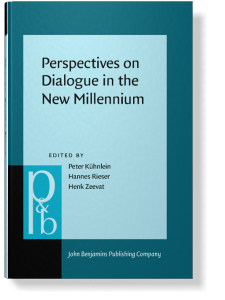Perspectives on Dialogue in the New Millennium
Editors
The formal treatment of the semantics and pragmatics of dialogue became possible through a series of breakthroughs in foundational methodology. There is broad consensus on a couple of issues, like the fact that some variety of dynamic theory is necessary to capture certain characteristics of dialogue. Other matters still are disputed.
This volume contains papers both of foundational and applied orientation. It is the result of one of a series of specialized Workshops on Formal Semantics and Pragmatics of Dialogue that took place in 2001. One can therefore truly say that it mirrors both the state of the art at the end of the past millennium and research strategies that are pursued at the beginning of the new millennium.
The collected papers cover the range from philosophy of language to computer science, from the analysis of presupposition to investigations into corpora, and touches upon topics like the role of speech acts in dialogue or language specific phenomena. This broad coverage will make the volume valuable for students of dialogue from all fields of expertise.
This volume contains papers both of foundational and applied orientation. It is the result of one of a series of specialized Workshops on Formal Semantics and Pragmatics of Dialogue that took place in 2001. One can therefore truly say that it mirrors both the state of the art at the end of the past millennium and research strategies that are pursued at the beginning of the new millennium.
The collected papers cover the range from philosophy of language to computer science, from the analysis of presupposition to investigations into corpora, and touches upon topics like the role of speech acts in dialogue or language specific phenomena. This broad coverage will make the volume valuable for students of dialogue from all fields of expertise.
[Pragmatics & Beyond New Series, 114] 2003. xii, 400 pp.
Publishing status: Available
© John Benjamins Publishing Company
Table of Contents
-
Perspectives on dialogue in the New MillenniumPeter Kühnlein, Hannes Rieser and Henk Zeevat | p. vii
-
Imperatives in dialogueAlex Lascarides and Nicholas Asher | pp. 1–24
-
Integrating conversational move types in the grammar of conversationJonathan Ginzburg, Ivan A. Sag and Matthew Purver | pp. 25–42
-
An HPSG-based representation model for illocutionary acts in crisis talkClaudia Sassen | pp. 43–57
-
Denial and presuppositionRob van der Sandt | pp. 59–77
-
Between binding and accommodationJennifer K. Spenader | pp. 79–110
-
Theories of presuppositions and presuppositional cliticsAlessandro Capone | pp. 111–133
-
Semantic meaning and four types of speech actEtsuko Oishi | pp. 135–147
-
Generalised and particularised implicatures of linguistic politenessMarina Terkourafi | pp. 149–164
-
Models of intentions in languageWilliam C. Mann | pp. 165–178
-
Context-dependent interpretation and implicit dialogue actsJörn Kreutel and Colin Matheson | pp. 179–192
-
Notes on analysing contextKerstin Fischer | pp. 193–214
-
A basic system for multimodal robot instructionAlois Knoll | pp. 215–228
-
An information state approach in a multi-modal dialogue system for human-robot conversationOliver Lemon, Anne Bracy, Alexander Gruenstein and Stanley Peters | pp. 229–242
-
Dialogue understanding in dynamic domainsBernd Ludwig | pp. 243–269
-
An information state update approach to collaborative negotiationRobin Cooper, Stina Ericsson, Staffan Larsson and Ian Lewin | pp. 271–286
-
Resolving Underspecification using Discourse InformationDavid Schlangen, Alex Lascarides and Ann Copestake | pp. 287–305
-
On coordinating interpretations — optimality and rational interactionAnton Benz | pp. 307–334
-
Modal particles and the common ground: Meaning and functions of German ja, doch, eben/halt and auchElena Karagjosova | pp. 335–349
-
(Non-)Temporal concepts conveyed by before, after, and then in dialogueThora Tenbrink and Frank Schilder | pp. 351–378
-
Name index | pp. 379–382
-
Subject index | pp. 383–395
“[...] this collection contributes to research on the semantics and pragmatics of discourse and dialogue and should be of interest to researchers in these fields as well as scholars working on artificial intelligence, computational linguistics, and other areas of formal semantics and pragmatics.”
Eric McCready, Aoyama Gakuin University, in Language Vol. 82:3 (2006)
Cited by (1)
Cited by one other publication
This list is based on CrossRef data as of 27 october 2024. Please note that it may not be complete. Sources presented here have been supplied by the respective publishers. Any errors therein should be reported to them.
Subjects
Main BIC Subject
CFG: Semantics, Pragmatics, Discourse Analysis
Main BISAC Subject
LAN009000: LANGUAGE ARTS & DISCIPLINES / Linguistics / General
